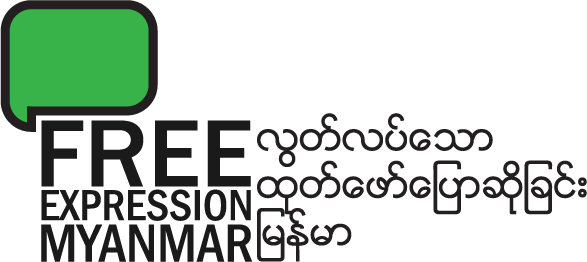Indonesian shutdown ruling is lesson for Myanmar — အင်ဒိုနီးရှားအင်တာနက်ဖြတ်တောက်မှုအပေါ် စီရင်ချက်သည် မြန်မာအတွက် သင်ခန်းစာယူစရာဖြစ်သည်။
FEM welcomes today’s Indonesian court ruling which declared that the West Papua internet shutdown was unlawful. Myanmar should learn from Indonesia.
The West Papuan shutdown shares many similarities to Myanmar’s internet shutdown in Rakhine and Chin States. Indonesia’s union government ordered the shutdown in 2019, against the wishes of the local West Papuans, just like in Myanmar. The Indonesian government claimed that the shutdown was to restore public order in restive West Papua and "prevent fake news from spreading”.
Indonesia’s court today declared the shutdown unlawful and "flawed in authority, substance and procedure". The losing case respondents were the Minister for Information and the President. The three presiding women judges demonstrated both their independence from the government and their willingness to challenge bad government policies that harm human rights.
The court stated that any order to limit the West Papuan people’s right to information must be made in accordance with Indonesia’s laws and not merely based on the union government’s discretion. The court ordered Indonesia’s government to publish an apology in three national newspapers and six television stations within one month of the ruling. The government is now liable to be sued for compensation by West Papuans.
Indonesia’s shutdown was comparative to Myanmar’s. Both government orders were made in violation of the three-part test in international law: 1) they were arbitrary and did not follow the letter of the law; 2) their aims were questionable and seemed to be more about quelling access to information in conflict areas; 3) they were blanket responses covering the whole internet rather than targeting specific unlawful webpages.
However, Indonesia’s courts are open and willing to protect people’s rights. They accepted a case from CSOs. They allowed the CSOs to submit legal arguments from international experts and court decisions from other countries (known to lawyers as “Amicus Curiae”). They declared that the people’s right to information is more important than government orders. They ordered the government to apologise. They opened up the government to being sued. In effect, they taught the government a lesson.
ယနေ့ အင်ဒိုနီးရှားနိုင်ငံတရားရုံးမှ အနောက်ပါပူးဝါပြည်တွင် အင်တာနက်ဖြတ်တောက်မှုသည် ဥပဒေနှင့်မညီကြောင်း ထုတ်ပြန်ကြေညာချက်အပေါ် FEM အနေဖြင့် အားပေးကြိုဆိုပါသည်။ မြန်မာနိုင်ငံအနေဖြင့် အင်ဒိုနီးရှားမှ သင်ခန်းစာယူသင့်သည်။
အနောက်ပါပူးဝါပြည်နယ် အင်တာနက်ပိတ်ဆို့ဖြတ်တောက်မှုများသည် မြန်မာနိုင်ငံရှိ ရခိုင်နှင့်ချင်းပြည်နယ်တို့တွင် ဖြစ်ပေါ်နေသော အင်တာနက်ဖြတ်တောက်မှုနှင့် တူညီချက်များစွာ ရှိသည်။ အင်ဒိုနီးရှားပြည်ထောင်စုအစိုးရသည် ၂၀၁၉ခုနှစ်တွင် မြန်မာကဲ့သို့ပင် အနောက်ပါပူဝါးဒေသခံများ၏ သဘောထားဆန္ဒများကို သွေဖယ်၍ အင်တာနက်ဖြတ်တောက်မှုများ ပြုလုပ်ရန် အမိန့်ပေးညွှန်ကြားခဲ့သည်။ အင်ဒိုနီးရှားအစိုးရမှ ဤပိတ်ဆို့ဖြတ်တောက်မှုသည် အနောက်ပါပူးဝါးပြည်ရှိ အများပြည်သူတည်ငြိမ်အေးချမ်းရေးကို ပြန်လည်ထိန်းသိမ်းရန် နှင့် “သတင်းအမှားများ ပျံ့နှံ့မှုကို တားဆီးရန်ဖြစ်သည်” ဟု အခိုင်အမာဆိုခဲ့သည်။
ယနေ့ အင်ဒိုနီးရှားနိုင်ငံတရားရုံးက အင်တာနက်ဖြတ်တောက်မှုသည် ဥပဒေနှင့် မညီကြောင်း၊ လုပ်ပိုင်ခွင့် အခွင့်အာဏာ၊ အယူအဆသဘောထား နှင့် လုပ်ထုံးလုပ်နည်းများတွင် မှားယွင်းချွတ်ချော်ခဲ့ကြောင်း ထုတ်ပြန်ကြေညာခဲ့သည်။ ယင်းအမှုတွင် အမှုရှုံးသွားသူများမှာ ပြန်ကြားရေးဝန်ကြီးနှင့် သမ္မတတို့ ဖြစ်သည်။ အမှုကို ဦးဆောင်စီရင်ရန် တရားဝင်ခန့်အပ်ခြင်းခံရသော အမျိုးသမီးတရားသူကြီးသုံးဦးသည် ၎င်းတို့၏ အစိုးရထံမှ လွတ်လပ်မှုနှင့် လူ့အခွင့်အရေးကို ထိခိုက်နေသည့် ဆိုးရွားသောအစိုးရမူဝါဒများကို စိန်ခေါ်ရန် စိတ်အားထက်သန်မှုရှိကြောင်း ပြသခဲ့သည်။
အနောက်ပါပူးဝါးပြည်သူများ၏ သတင်းအချက်အလက်ရယူပိုင်ခွင့်ကို ကန့်သတ်သည့် မည်သည့်အမိန့်ကိုမဆို ပြည်ထောင်စုအစိုးရ၏ အခြေအနေကိုလိုက်၍လိုသလိုဆုံးဖြတ်သည့် ဆုံးဖြတ်ချက်အပေါ် အခြေမခံဘဲ၊ အင်ဒိုနီးရှားဥပဒေများနှင့်အညီ ပြုလုပ်ရမည်ဟု တရားရုံးက ဖော်ပြခဲ့သည်။ အင်ဒိုနီးရှားအစိုးရအား တရားရုံးက စီရင်ချက်ချပြီး တစ်လအတွင်း နိုင်ငံပိုင်သတင်းစာ (၃)ခု နှင့် ရုပ်မြင်သံကြားဌာန (၆)ခုတွင် တောင်းပန်စာကို ထုတ်ပြန်ရန်လည်း အဆုံးအဖြတ်ပေးခဲ့သည်။ ယခုအခါတွင် အစိုးရသည် လျော်ကြေးအတွက် အနောက်ပါပူးဝါးပြည်သူများထံမှ တရားစွဲဆိုခြင်းကို ခံရနိုင်သည်။
အင်ဒိုနီးရှားအင်တာနက်ဖြတ်တောက်မှုနှင့် မြန်မာ့အင်တာနက်ဖြတ်တောက်မှုတို့မှာ တူညီသည်။ အစိုးရနှစ်ရပ်စလုံး၏အမိန့်များသည် နိုင်ငံတကာဥပဒေ၏ အဆင့် ၃ ဆင့်ပါ ဆန်းစစ်ချက်ကို ဖောက်ဖျက်ကျူးလွန်နေကြောင်း တွေ့ရှိရသည်။
၁။ အမိန့်များသည် အာဏာရှင်ဆန်ပြီး ဥပဒေက ညွှန်ကြားသည့်အတိုင်း လိုက်နာမှုမရှိခဲ့ပေ။
၂။ ၄င်းတို့၏ ရည်ရွယ်ချက်များသည် မေးခွန်းထုတ်စရာကောင်းနေပြီး၊ ပဋိပက္ခဖြစ်ပွားရာဒေသများတွင် သတင်းအချက်အလက် ရယူရန်အခွင့်အလမ်းကို ပိတ်ဆို့ဖြတ်တောက်သည် နှင့် တူနေသည်။
၃။ ဥပဒေနှင့် မညီသော တိကျသည့် အင်တာနက်စာမျက်နှာများ (ဝက်(ဘ်)ဆိုဒ်များ) ကို ပစ်မှတ်ထားခြင်းထက် ဒေသတခုလုံးအား အင်တာနက်ဖြတ်တောက်လိုက်ပြီး အလုံးစုံလွှမ်းခြုံပိတ်ဆို့သည့် မူဝါဒဖြင့် တုံ့ပြန်ခဲ့သည်။
သို့သော်လည်း အင်ဒိုနီးရှားတရားရုံးများသည် ပွင့်လင်းမြင်သာမှုရှိပြီး အများပြည်သူ၏ အခွင့်အရေးကို ကာကွယ်လိုစိတ်ရှိကြသည်။ ၄င်းတို့သည် အရပ်ဘက်အဖွဲ့အစည်းများထံမှ အမှုကို လက်ခံဆောင်ရွက်ပေးခဲ့သည်။ ထို့အပြင် အရပ်ဘက်အဖွဲ့အစည်းများကို ( “Amicus Curiae” ဟု ရှေ့နေများ သုံနှုန်းကြသော) အခြားနိုင်ငံများမှ တရားရုံးဆုံးဖြတ်ချက်များနှင့် နိုင်ငံတကာကျွမ်းကျင်ပညာရှင်များထံမှ တရားဝင်ငြင်းဆိုချက်/လျှောက်လဲချက်များကို တင်သွင်းခွင့် ပြုခဲ့သည်။ အများပြည်သူ၏ သတင်းအချက်အလက်ရယူပိုင်ခွင့်သည် အစိုးရ၏အမိန့်ညွှန်ကြားချက်များထက် ပို၍အရေးပါကြောင်း ကြေညာခဲ့သည်။ တောင်းပန်ရန် အစိုးရအား အမိန့်ချမှတ်ခဲ့သည်။ အစိုးရအား တရားစွဲဆိုနိုင်ရန် လမ်းဖွင့်ပေးခဲ့သည်။ အမှန်တကယ်တမ်းတွင်တော့ အင်ဒိုနီးရှားနိုင်ငံတရားရေးမဏ္ဍိုင်သည် အစိုးရအား သင်ခန်းစာတစ်ရပ်ပေးခဲ့ခြင်း ဖြစ်သည်။
